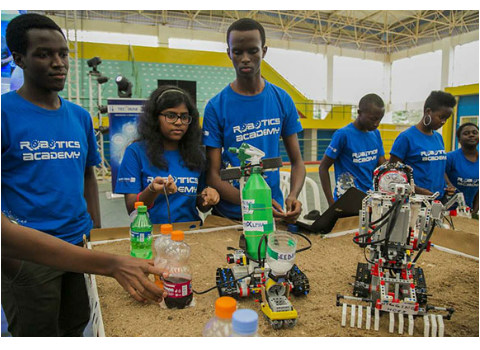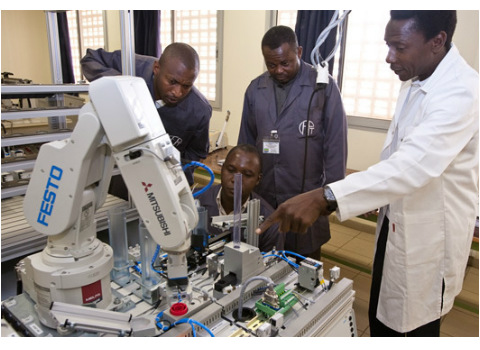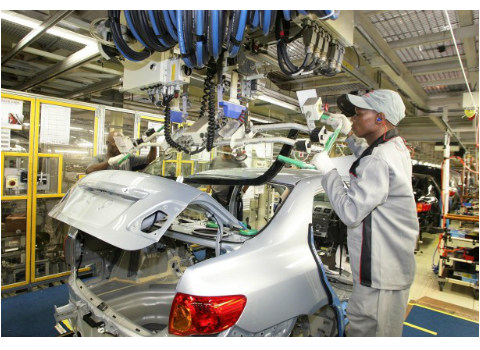The latest industrial revolution is here — with robotics technology. And for still-developing nations like those in Africa, robotics presents a huge opportunity. In recent years, several countries in Africa have adopted robotics into different sectors like healthcare management, public transportation, banking and agriculture. Here we’ll take a quick look at African robotics, and how robots can help African people.
African robotics gets rolling
The African robotics industry is still in its infancy stage, but it is developing rapidly. In some parts of the continent, robots are used in mining fields, controlling traffic and fighting diseases.
In 2014 for example, Liberia introduced Africa’s first ever automated decontamination machine (photo top of page). This robotic machine can disinfect a room — including eliminating the Ebola virus — in just a few minutes.
Another African nation that’s introduced robotic machines into the public sector is the Democratic Republic of Congo. In the capital city of Kinshasa, authorities have installed two eight-foot tall robots to help direct traffic and prevent road accidents.
Botswana, a landlocked country known for gorgeous diamonds, has also introduced robots into its mining sector. These robots are designed to perform tasks and go into depths that human miners cannot simply reach, bringing up tennis-ball size stones.
 Just as in other parts of the world, in Africa there is a new craze for robotics development. Local high schools and universities around Africa are introducing programs that focus on favorite Universal Robots and artificial intelligence (AI), sometimes with the help of overseas universities like MIT.
Just as in other parts of the world, in Africa there is a new craze for robotics development. Local high schools and universities around Africa are introducing programs that focus on favorite Universal Robots and artificial intelligence (AI), sometimes with the help of overseas universities like MIT.
Collaborative robots = cobots
Also, collaborative robots (cobots) have now become a standard practice in mining and manufacturing industries. As their name implies, collaborative robots are those designed specifically to help workers do their jobs more efficiently.
This all sounds exciting, but what will cobots really mean for Africa?
Because collaborative robots are designed to work seamlessly with workers in all fields, they facilitate improvements in workers efficiency. Cobots’ great flexibility and ability to perform heavy tasks that would be dangerous for humans are just some of their advantages. Collaborative robots are also highly versatile, with user friendly software tools and integrated sensory functions.
 Cobots are being integrated into a wide range of disruptive digital manufacturing innovations that allow a factory to perform smarter, and produce better quality material. Their flexible nature allows them to perform a range of applications, such as production of finished and semi-finished goods, product testing, packaging, and lifting loads. Cobots can also provide logistic solutions. In short, their possibilities for manufacturing are limitless.
Cobots are being integrated into a wide range of disruptive digital manufacturing innovations that allow a factory to perform smarter, and produce better quality material. Their flexible nature allows them to perform a range of applications, such as production of finished and semi-finished goods, product testing, packaging, and lifting loads. Cobots can also provide logistic solutions. In short, their possibilities for manufacturing are limitless.
Robots will create more jobs
Much of the current discussion on automation of the manufacturing industry is that robots are likely to displace jobs that millions of workers, families and communities across the continent have always depended on. However, new robotics technologies for the workplace will also create new jobs that didn’t exist before.
Advances in robotics and related computing can free up workers for new tasks, and open up more demand for people to fill technology jobs. These might include data analysts, software engineers and social media analysts. And besides tech jobs, we’ll likely also see more demand for people positions like customer service reps, trainers and teachers.
 The robotic automation of manufacturing will also give rise to new job opportunities in the design, construction, vending, installation, management and continued maintenance of robots. This is the promise of a robotics future for Africa and everywhere else in the world.
The robotic automation of manufacturing will also give rise to new job opportunities in the design, construction, vending, installation, management and continued maintenance of robots. This is the promise of a robotics future for Africa and everywhere else in the world.
Our robotics future starts now
Aside from manufacturing, a great number of other industries across Africa have already adopted collaborative robots. As we’ve discussed, cobots are incredibly efficient and systemic. They not only increase the production of materials and finished goods, but are easy to use and increase worker safety.
In the long run, companies in manufacturing and other industries that adopt robotics technologies can increase their production and quality of service, while saving on capital costs. The increasing acceptance of African robotics will be a significant factor that will catalyze the growth of industries and the African economy.





